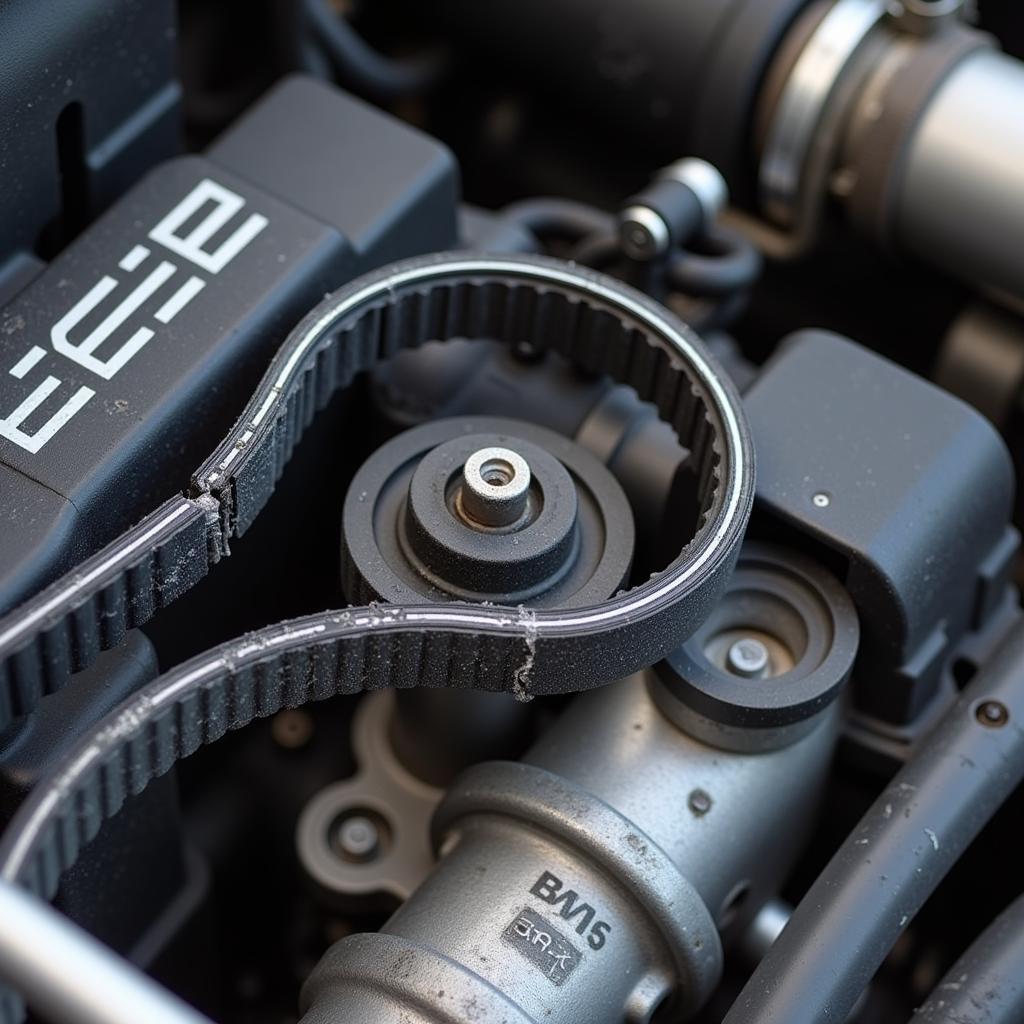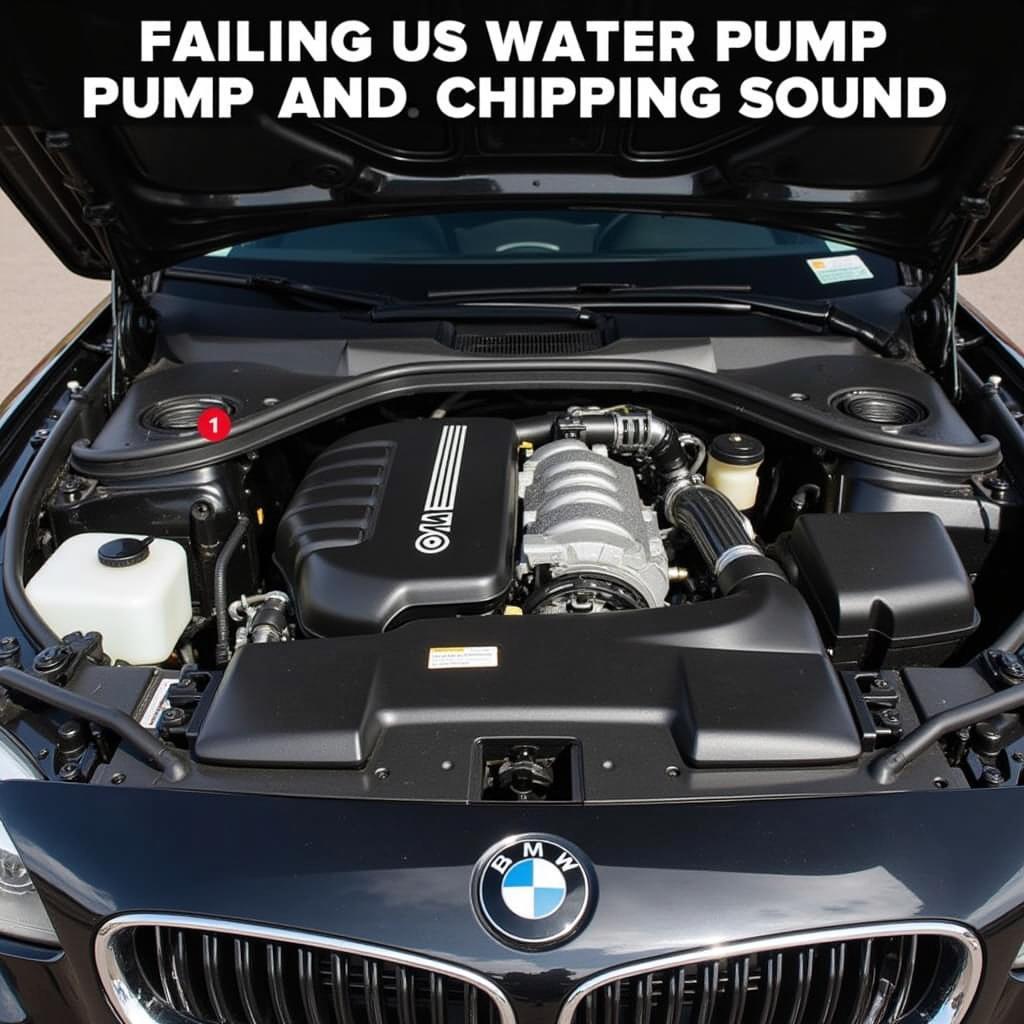If you’re hearing a chirping sound near the front end of your 2002 BMW 325i, you’re not alone. This is a common issue, and diagnosing the source can sometimes be a bit tricky. This article will help you pinpoint the cause of that annoying chirp and get your BMW back to running smoothly, covering everything from common culprits like belts and pulleys to less obvious issues.
Common Causes of Chirping Sounds in a 2002 BMW 325i
Several components under the hood of your 325i can create a chirping sound. Let’s explore the most frequent offenders.
Belts and Pulleys
One of the most common causes is a worn or loose serpentine belt. This belt drives essential components like the alternator, power steering pump, and air conditioning compressor. As the belt ages, it can dry out, crack, and become glazed, leading to a chirping or squealing sound, especially noticeable upon startup or when accelerating. A worn tensioner or idler pulley can also create similar noises.
- Inspect the belt: Look for cracks, fraying, or glazing.
- Check the tensioner: Ensure it’s applying proper pressure to the belt.
- Listen carefully: Try to pinpoint the location of the chirp. If it’s coming from the belt area, that’s a strong indicator.
 Worn serpentine belt causing chirping sound in a 2002 BMW 325i
Worn serpentine belt causing chirping sound in a 2002 BMW 325i
Power Steering Pump
A failing power steering pump can also produce a chirping sound, often accompanied by a groaning noise, particularly when turning the steering wheel. Low power steering fluid can exacerbate this issue, so checking the fluid level is a good starting point.
- Check the power steering fluid: Ensure the reservoir is filled to the proper level.
- Inspect for leaks: Look for signs of fluid leakage around the pump and hoses.
- Listen for changes in the sound: Does the chirping intensify when you turn the wheel?
Water Pump
While less common, a failing water pump can also produce a chirping or whining sound. This is often accompanied by overheating and coolant leaks.
- Check the coolant level: Ensure the coolant is at the correct level.
- Inspect for leaks: Look for signs of coolant leakage around the water pump.
- Monitor the temperature gauge: Watch for any signs of overheating.
 Failing water pump causing chirping noise in a BMW 325i engine bay
Failing water pump causing chirping noise in a BMW 325i engine bay
Diagnosing the Chirping Sound – A Step-by-Step Guide
- Listen carefully: Pay close attention to when the chirping occurs – at startup, during acceleration, when turning, etc.
- Visual inspection: Open the hood and visually inspect the belts, pulleys, and other components for any signs of wear or damage.
- Use a stethoscope (optional): A mechanic’s stethoscope can help pinpoint the source of the noise.
- Check fluids: Ensure all relevant fluid levels are correct (power steering, coolant).
- Consult a professional: If you’re unable to diagnose the problem yourself, it’s best to consult a qualified mechanic.
What if the Chirping is Intermittent?
Intermittent chirping can be especially frustrating to diagnose. It can be caused by factors like temperature changes, humidity, or even the engine’s load. Keeping a log of when the chirping occurs can be helpful in identifying the culprit.
Conclusion: Addressing the Chirping Sound in Your 2002 BMW 325i
A chirping sound in your 2002 BMW 325i shouldn’t be ignored. Addressing the issue promptly can prevent further damage and save you money in the long run. By understanding the potential causes and following the diagnostic steps outlined above, you’ll be well-equipped to tackle the chirp and get your BMW back on the road.
FAQ
- Can a chirping sound damage my engine? Yes, if the chirp is caused by a failing component like a belt or water pump, ignoring it can lead to more serious engine damage.
- How much does it cost to fix a chirping sound? The cost depends on the underlying cause. A simple belt replacement might be relatively inexpensive, while a failing water pump could be more costly.
- Can I drive my car with a chirping sound? While it might be possible to drive for a short time, it’s best to address the issue as soon as possible to prevent further damage.
- Is it always a belt or pulley causing the chirp? While common, other components like the power steering pump or water pump can also cause chirping noises.
- What tools do I need to diagnose a chirping sound? A visual inspection can often identify the problem. A mechanic’s stethoscope can be helpful for pinpointing the source.
- How often should I replace my serpentine belt? Consult your BMW’s owner’s manual for recommended replacement intervals.
7.. What if the chirping only happens when it’s cold? This can indicate a belt or pulley issue that is exacerbated by lower temperatures.
Common Situations
- Chirping on startup: Often indicates a worn belt or pulley.
- Chirping while accelerating: Could be a belt slipping under load.
- Chirping while turning: Suggests a power steering issue.
Related Articles
- BMW Serpentine Belt Replacement Guide
- Understanding Your BMW’s Cooling System
- Common BMW 325i Problems
Need help? Contact us via Whatsapp: +1 (641) 206-8880, Email: [email protected] Or visit us at: 276 Reock St, City of Orange, NJ 07050, United States. Our customer support team is available 24/7.

